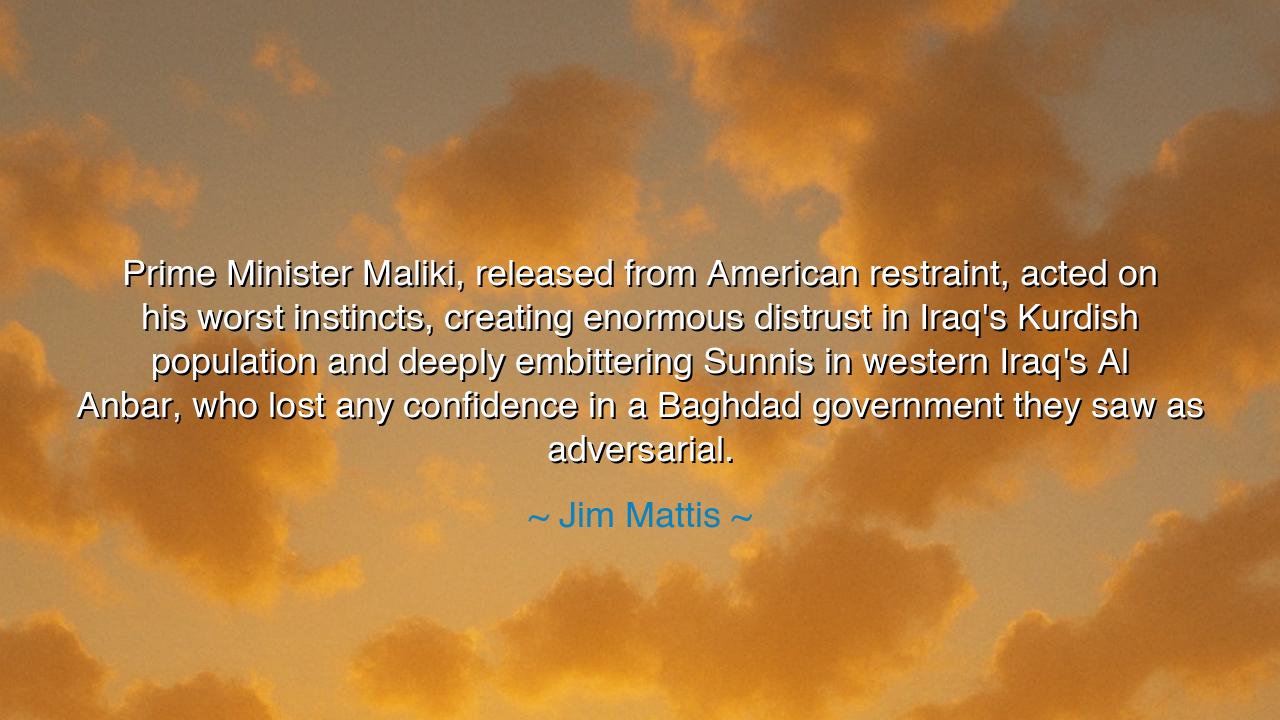
Prime Minister Maliki, released from American restraint, acted on
Prime Minister Maliki, released from American restraint, acted on his worst instincts, creating enormous distrust in Iraq's Kurdish population and deeply embittering Sunnis in western Iraq's Al Anbar, who lost any confidence in a Baghdad government they saw as adversarial.






Hear, O students of history and seekers of truth, the words of General Jim Mattis, who once spoke with grave reflection: “Prime Minister Maliki, released from American restraint, acted on his worst instincts, creating enormous distrust in Iraq's Kurdish population and deeply embittering Sunnis in western Iraq's Al Anbar, who lost any confidence in a Baghdad government they saw as adversarial.” Within this statement lies the sorrow of war, the wisdom of command, and the eternal lesson of power unrestrained by wisdom and justice. Mattis, a soldier not merely of arms but of intellect, spoke these words as both witness and warning: that when authority is left unchecked, the seeds of division bloom into destruction.
The origin of this quote lies in the years following the Iraq War, when the United States withdrew its military presence and left Iraq to govern itself. Nouri al-Maliki, the Prime Minister of Iraq, emerged as a leader torn between opportunity and temptation. Freed from the moderating influence of American oversight, Maliki succumbed to sectarian instincts—favoring his Shia allies and marginalizing the Sunni and Kurdish communities that shared his nation. The result was catastrophic. The unity of Iraq—so fragile and dearly bought—fractured once more, and from the chaos rose new forces of hatred and extremism, including the dark tide of the Islamic State. Mattis, who had commanded Marines in Iraq, saw this not as an inevitable fate but as a failure of moral leadership, a betrayal of the principle that power must serve the common good, not the narrow interests of one faction.
His words are steeped in the wisdom of experience, for Mattis understood that the nature of power is to corrupt when unrestrained. He speaks of Maliki’s “worst instincts”—those impulses toward fear, revenge, and domination that lie dormant in all rulers. When unchecked by allies, institutions, or conscience, such instincts turn governance into tyranny. Thus, the general’s warning is not limited to Iraq; it applies to every leader and every nation. Without the discipline of justice and humility, even liberation can become oppression.
History offers many echoes of this tragedy. Consider the story of Julius Caesar, who, once freed from the restraints of the Roman Senate, crossed the Rubicon and transformed a republic into an empire. He began with promises of stability and reform, but soon his power eclipsed all accountability, and Rome’s democracy fell to the ambition of a single man. Like Maliki, Caesar’s unchecked authority sowed division and distrust, reminding all generations that power without restraint breeds ruin—and that no ruler, however noble his beginnings, can escape the corruption of absolute control.
Mattis’s lament is also a meditation on the fragility of trust. The Kurdish and Sunni populations, once cautiously hopeful, lost faith in Baghdad’s promises. In the absence of fairness, they turned inward, seeking safety in separation. Thus, a government that should have united its people instead drove them apart, for trust, once broken, is not easily mended. From this we learn that the soul of governance lies not in force, but in faith—faith between ruler and ruled, between communities, between the promise of law and the practice of justice.
And yet, his tone is not one of despair. Beneath his sorrow lies a call to moral vigilance. He reminds us that restraint—whether in leaders or nations—is not weakness but strength. The presence of oversight, the humility to listen, the courage to include—these are the true marks of power. Without them, authority becomes a mirror of ego; with them, it becomes an instrument of peace. Mattis’s wisdom is that of the soldier who has seen the price of pride paid in the blood of the innocent.
The lesson, then, is as old as civilization: power must be governed by principle, and leadership must be tempered by empathy. Whether in government, community, or family, one must never rule by instinct alone, but by conscience. Seek always the counsel of those who differ from you; let compassion guide ambition; and remember that to hold power is to hold responsibility for the souls of others. For when restraint is abandoned, and justice forgotten, the very foundations of peace crumble.
Thus, the words of Jim Mattis endure not merely as commentary on Iraq, but as eternal counsel for humankind. They teach that no victory is secure unless it is shared, and no government is strong unless it serves all its people. Let those who lead remember: when power is loosed from restraint, it devours its own nation; but when it is bound by wisdom and mercy, it becomes the guardian of civilization itself.






AAdministratorAdministrator
Welcome, honored guests. Please leave a comment, we will respond soon